Domestic Animals Name Meaning & Image | Necessary Vocabulary
Domestic Animal
Domestic / dəˈmestɪk / (ডএˈমেছটিক্) adj [(of animals) kept on farms or pets; not wild] (<জীবজন্তু সম্পর্কে> গৃহপালিত; পোষা):
Domestic Animal Related Necessary Vocabulary Note
Ø <VERB> Domesticate / dəˈmestɪkeɪt / (ডএˈমেছটিকেইট্) v {Pt. Pp. domesticated / dəˈmestɪkeɪtɪd / (ডএˈমেছটিকেইটিড্)} [to bring wild animals or plants under human control in order to provide food, working for humans, and companionship] (<জীবজন্তু সম্পর্কে > পোষ মানানো): Dogs were probably the first animals to be domesticated.
Ø Animal / ˈænɪml / (ˈএ্যানিম্ল্) n [a creature that is not a bird, a fish, a reptile, and insect or human] (প্রাণী): This animal can be trained to follow simple orders.
Ø Farm / fɑːrm / (ফা:র্ম) n [an area of land, and the buildings on it, used for growing crops and/or keeping animals as a business] (খামার): Farm incomes rose 11% last year. To live/work on a farm
Ø Pet / pet / (পেট্) n [an animal, a bird, etc. that you have at home for pleasure, rather than one that is kept for work or food] (পোষা প্রাণী): The apartment we live in doesn’t allow pets of any kind.
Ø Wild / waɪld / (ওআইল্ড্) adj [living or growing in natural conditions; not kept in a house or on a farm] (বন্য, বুনো): The flowers grow, wild in the mountains.
Cattle
Cattle / ˈkætl / (ˈক্যাটল্) n [large farm animals, cows, and bulls that are kept on a farm for their milk or meat. They are raised as livestock for beef, as dairy animals for milk and other dairy products, and as draught animals, oxen, or bullocks that pull carts, ploughs, and other implements. Other products include leather and dung for manure or fuel. It is thought that around 18% of the greenhouse gases that are currently being released into the atmosphere are coming from cattle. This is due to the methane that cattle expel through burping and flatulence. There are about 1.3 billion cattle in the world] (গরু): Cattle were first domesticated in Neolithic times. Cattle grazing in the fields.
Ø Raise / reɪz / (রেইজ্) v {Pt. Pp. raised / reɪzd / (রেইজ্ড্)} [to breed particular farm animals or to grow particular crops, until they are completely grown] (বংশবৃদ্ধি ও লালনপালন করা): The farmer raises (=breeds) chickens and pigs.
<SYN> Breed
 |
| Livestock |
Ø Livestock / ˈlaɪvstɑːk / (ˈলাইভ্স্টাঃক্) n [the animals kept on a farm, for example, cows, sheep, birds, and chickens] (খামারে পালিত পশুপাখি যেমন, গরু, ছাগল, হাসমুরগী ইত্যাদি):
Ø Ruminant / ˈruːmənənt / (ˈরূমএনএন্ট্) n [a type of animal that brings up food from its stomach and chews it again, for example, a cattle, sheep, or deer] (রোমন্থক বা জাবর-কাটা <প্রাণী>):
Ø Beef / biːf / (বীফ্) n [the flesh of cattle, which is eaten] (গো-মাংস; গরুর মাংস): Dad stood up to carve the beef.
Ø Dairy / ˈderi / (ˈডেইরি) n {Plu. dairies} [a place on a farm where milk is kept and where butter and cheese are made] (যে ভবনে দুগ্ধ সংরক্ষন এবং বাটার ও চিজ উৎপাদন হয়; গব্যশালা)
Ø Draught / drɑːft / (ড্রাঃফ্ট্) adj [(of animals) used for pulling heavy loads, vehicles, etc.] (<প্রাণী সম্বন্ধে> গাড়ি ইত্যদি টানার কাজে ব্যবহৃত পশু):
 |
| Cart |
Ø Cart / kɑːrt / (কাঃরট্) n [a vehicle with two or four wheels that is pulled by horse/cattle and used for carrying goods] (ঘোড়া বা গরুর গাড়ি; এক্কা): he brought the vegetables in an ox cart. A cattle and cart
 |
| Plough |
Ø Plough / plaʊ / (প্লাউ) n {US plow} [large farming equipment with one or several blades, pulled by a tractor or by animals] (লাঙ্গল): Plough is used for digging and turning over soil, especially before seeds are planted.
Ø Implement / ˈɪmplɪmənt / (ˈইম্প্লিমএনট্) n [a tool or an instrument, often one that is quite simple and that is used outdoors] (হাতিয়ার): Garden/ household/ agricultural implement
Ø Include / ɪnkluːd / (ইন্ক্লূড্) v {Pt. Pp. included / ɪnkluːdɪd / (ইন্ক্লূডিড্)} [to contain something as a part of something else, or to make something part of something else] (অন্তর্ভুক্ত করা; -সহ): Does the price include tax?
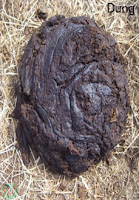 |
| Dung |
Ø Dung / dʌŋ / (ডাং) n [solid waste from animals, especially cattle and horses or large one] (গবর বা পশুর মল): Cattle dung
Ø Manure / məˈnʊr / (মএˈনুএর্) n [the waste matter from animals that is spread over or mixed with the soil to help plants and crops grow] (সার): Dig plenty of well-rotted manure into the soil.
Ø Greenhouse gas / ˈgriːnhaʊs gæs / (ˈগ্রীন্হাউছ্ গ্যাছ্) n [any of the gases that are thought to cause the greenhouse effect, especially carbon dioxide] (পৃথিবীর জন্য ক্ষতিকারক গ্যাস):
Ø Atmosphere / ˈætməsfɪr / (ˈএ্যাট্মএছফিএর্) n [the mixture of the gases that surrounds the earth] (বায়ুমণ্ডল; আবহমণ্ডল): Pollution of the atmosphere
Ø Methane / ˈmeθeɪn / (ˈমেথেইন্) n {Symb. CH4} [a gas without color or smell that burns easily and is used as fuel. Natural fuel gas consists mainly of methane] (বর্ণহীন, গন্ধহীন দাহ্য গ্যাসবিশেষ; মিথেন গ্যাস):
Ø Expel / ɪkˈspel / (ইকˈছ্পেল্) v {Pt. Pp. expelled / ɪkˈspeld / (ইকˈছ্পেল্ড্)} [to force air or liquid out of a part of the body or from a container] (নির্গত করা; বিচ্ছুরিত করা): When we breathe out we expel air from our lungs.
Ø Burp / bɜːrp / (বা্র্প্) v [to let out air from the stomach through the mouth, making a noise] (ঢেকুর তোলা):
Ø Flatulence / ˈflætʃələns / (ˈফ্ল্যাচএলএন্ছ্) n [gas in the stomach and bowels] (পেট ফাপা; পেটের গ্যাস): Eating beans can cause flatulence.
Ø Neolithic / ˌniːəˈlɪθɪk / (ˌনীএˈলিথিক্) adj [belonging to the period when humans used tools and weapons made of stone and had just developed farming] (নব্য প্রস্তুরযুগীয়): The Neolithic period is sometimes called the new stone age.
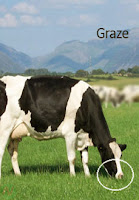 |
| Graze |
Ø Graze / greɪz / (গ্রেইজ্) v {Pt. Pp. grazed / greɪzd / (গ্রেইজ্ড্)} [(of cattle, sheep, etc.) to eat grass that is growing in a field] (ঘাস খাওয়া): The field had been grazed by sheep.
Bull
Bull / bʊl / (বুল্) n [a bull is an intact (i. e., not castrated) adult male of any animal in the cattle family. The female counterpart to a bull is a cow, while a male of the species which has been castrated is a steer, ox or bullock. Bulls are much more muscular than cows, with thicker bones, large feet, a very muscular neck, and a large, bony head with protective ridges over the eyes.
The word “bull” also denotes the males of other bovines, including bison, and water buffalo and as well as many other species of large animals, including elephants, camels, elk, moose, and whales] (ষাঁড়; বৃষ; ছেলে গরু): If you want to believe all that bull it’s up to you.
Ø Intact / ɪnˈtækt / (ইনˈট্যাক্ট্) adj [complete and in the original state] (অক্ষত; অক্ষুণ্ণ): Most of the house remains intact even after two hundred years.
<SYN> Undamaged
Ø Castrate / ˈkæstreɪt / (ˈক্যাছট্রেইট্) v {Pt. Pp. castrated / ˈkæstreɪtɪd / (ক্যাছট্রেইটিড্)} [to remove the testicles of a male animal or human] (<পুরুষ জাতীয় প্রাণীকে> খোঁজা বা খাসি করা):
Ø Counterpart / ˈkaʊntərpɑːrt / (ˈকাউনটএর্পাঃর্ট্) n [a person or thing that has the same position or function as Sb/Sth else in a different place or situation] (প্রতিপক্ষ): The Prime Minister is to meet his European counterparts to discuss the war against drugs.
<SYN> Opposite number
Ø Bony / ˈboʊni / (ˈবৌনি) adj [(part of the body) very thin so that the bones can be seen under the skin] (অস্থিসার; কৃশ) a tall bony man
Ø Protective / prəˈtektɪv / (প্রএˈটেক্টিভ্) adj [providing or intended to provide protection] (নিরাপত্তামূলক্): Workers should wear fully protective clothing.
Ø Denote / dɪˈnoʊt / (ডিˈনৌট্) v [to represent something] (<কোনোকিছু> প্রতিক হওয়া; নির্দেশ করা): The color red is used to denote passion or danger.
<SYN> Represent
Ø Bovine / ˈboʊvaɪn / (ˈবৌভাইন্) adj [connected with cattle] (গবাদি পশু সংক্রান্ত): bovine diseases
Cow
Cow / kaʊ / (ক্যাউ) n [large female farm animals are raised in many different countries around the world, mainly for cow natural resources such as milk, meat, and leather. In India, the cow is seen as a sacred animal. Large female adult mammals such as elephants, whales, and seals are also called cow] (গাভী; গাই): Tethered cow grazed among the apple trees, has a big udder.
Ø Udder / ˈʌdər / (ˈআডএর্) n [an organ shaped like a bag that produces milk and hangs underneath the body of a cow, goat, sheep, or other animals] (গাভি, ছাগল ইত্যাদির স্তন; পালান):
 |
| Udder |
Ø Tether / ˈteðər / (ˈটেদএর্) n [a rope or chine used to tie an animal to Sth, usually so that it can move freely within a small area] (<ঘাস খাওয়ার সময়> পশুকে বেঁধে রাখার দড়ি বা শিকল):
<VERB> Tether / ˈteðər / (ˈটেদএর্) v [to tie an animal to a post so that it cannot move very far] (দড়ি বা শিকল দিয়ে পশুকে খুটিতে বেধে রাখা): He tethered his cow to a tree.
Ø Sacred / ˈseɪkrɪd / (ˈছেইকরিড্) adj [considered to be holy and deserving respect, especially because of a connection with a god] (পূত; পবিত্র; পূজনীয়): Cows are sacred to Hindus.
Ox
Ox / ɑːks / (আঃকছ্) n {Plu. oxen} [an ox also known as a bullock in Australia and India is a bovine trained as a draught animal. For a bull (= a male cattle) that has been castrated (=had part of its sex organs removed), castration makes the animals easier to control. Oxen are used for plowing, transport (pulling carts, hauling wagons, and even riding), threshing grain by trampling, and powering machines that grind grain or supply irrigation among other purposes. Oxen may be also used to pull logs in forests] (বলদ; খাসি করা গরু; <হালটান> ষাঁড়):
Ø Train / treɪn / (ট্রেইন্) v {Pt. Pp. trained / treɪnd / (ট্রেইন্ড্)} [to teach a person or an animal the skills for a particular job activity; to be taught in this way] (প্রশিক্ষণ দেওয়া/পাওয়া): They trained the dog to sniff out drugs.
Ø Haul / hɔːl / (হোল্) v {Pt. Pp. hauled / hɔːld / (হোল্ড্)} [to pull Sth slowly with a lot of effort] (শক্তিদিয়ে টানা): The wagons were hauled by horses.
Ø Riding / ˈraɪdɪŋ / (ˈরাইডিং) n [the sport or activity of riding animals] (<প্রাণীর> পিঠে চড়া): Have you ever been riding?
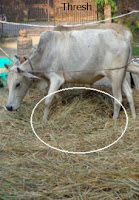 |
| Thresh |
Ø Thresh / θreʃ / (থ্রেশ্) v {Pt. Pp. threshed / θreʃt / (থ্রেশ্ট্)} [to separate grains of rice, wheat, etc. from the rest of the plant using a machine or, especially in the past, by hitting it with a special tool] (<শস্যাদি> মাড়াই করা; মাড়ানো; আছড়ানো):
Ø Grain / greɪn / (গ্রেইন্) n [the small hard seeds of plants, especially a plant like a grass such as rice or wheat] (শস্যের দানা, যেমন চাউল, গম): a few grains of rice
Ø Trample / ˈtræmpl / (ˈট্র্যামপল্) v {Pt. Pp. trampled / ˈtræmpld / (ট্র্যামপল্ড্)} [to step heavily on Sb/Sth so that you crush or harm them with feet] (পায়ে মাড়ানো): He was trampled to death by a runaway horse.
Ø Grind / graɪnd / (গ্রাইন্ড্) v {Pt. Pp. ground / graʊnd / (গ্রাউন্ড্)} [to make Sth into small pieces or power by pressing between two hard surfaces] (চূর্ণ বা গুড়া করা): They grind the grain into flour between two large stones.
Ø Log / lɔːg / (লোগ্) n [a thick piece of wood that is cut from or has fallen from a tree] (<গাছের> গুড়ি): The road was blocked by fallen logs.
1. Calf
Calf / kæf / (ক্যাফ্) n {Plu. calves / kævz / (ক্যাভ্জ্)} 1. [a young cow, or the young of various large mammals such as elephants and whales] (১। বাছুর; গোবৎস; ২। <হাতি ও তিমির>বাচ্চা): Their prize cow is in a calf.
 |
| 2. Calf |
2. Calf / kæf / (ক্যাফ্) n {Plu. calves / kævz / (ক্যাভ্জ্)} [the back part of the human leg between the ankle and the knee] (<মানুষের>পায়ের গুল বা ডিম): I have torn a calf muscle.
Ø <VERB> Calve / kæv / (ক্যাভ্) v [(of a cow) to give birth to a calf] (বাছুর প্রসব করা): Four cows calved overnight.
Ø Mammal / ˈmæml / (ˈম্যামল্) n [any animal of which the female gives birth to babies, not egg, and feeds them on milk from her own body] (স্তন্যপায়ী প্রাণী): Cows, humans, and bats are all mammals, but birds, fish, and crocodiles are not.
Ø <IDM> Such as / sʌtʃ əz / (ছাচ্ এজ্) IDM [for example] (যেমন্): Wildflowers such as primroses are becoming rare.
Ø Overnight / ˌoʊvərˈnaɪt / (ˌওউভএরˈনাইট্) adv [during or for the night; suddenly or quickly] (রাতের বেলায়; সারারাত ব্যাপি; রাতারাতি): Don’t expect it to improve overnight.
<ADJ> Overnight [happening during the night; for a night] (রাত্রিকালীন): an overnight flight.
Heifer
Heifer / ˈhefər / (ˈহেফএর্)
n [a young female cow, especially one that has
not yet given birth to a calf] (বকনাবাছুর):
Zebu
Zebu / ˈziːbuː / (ˈজীবূ) n [an animal of a species of cattle family with long horns and a hump (=high part] on its back that is native to the jungles of South Asia and it is the only cattle species that can easily adapt to life in the hot climates. The zebu is also known as the humped cattle as it has a very distinctive hump on its upper back] (জীবূ; কুঁজওয়ালা ষাঁড়):
 |
| Hump |
Ø Hump / hʌmp / (হাম্প্) n [a round raised part on a person’s or animal’s back] (কুঁজ; ককুদ): Some types of the camel have two humps and others have one.
Ø Native / ˈneɪtɪv / (ˈনেইটিভ্) adj {~ (to)} [describes plants and animals which grow naturally in a place, and have not been brought there from somewhere else] (কোনো বিশেষ এলাকার স্বাভাবিক প্রাণী বা উদ্ভিদ; দেশজ্): The horse is not native to America – it was introduced by the Spanish.
<SYN> Indigenous
Ø Adapt / əˈdæpt / (এˈড্যাপ্ট্) v {Pt. Pp. adapted / əˈdæptɪd / (এড্যাপ্টিড্)} [to change something to suit different conditions or uses] (খাপ খাওয়ানো; মানাইয়া লওয়া; অভিযোজন করা): Some animals have a remarkable ability to adapt to changing environments.
<SYN> Adjust
Ø Distinctive / dɪˈstɪŋktɪv / (ডিˈছটিঙ্কটিভ্) adj [having a quality or characteristic that makes Sth different and easily noticed] (পার্থক্যসূচক; স্বাতন্ত্রসূচক): ‘i’ and ‘iː’ are two distinct vowel sounds in English.
Takin
Takin /
ˈtɑːkiːn /
(ˈটাঃকীন্)
n [also called cattle chamois or gnu goat, is a
large species found in the eastern Himalayas, having a shaggy coat, short legs,
and horns that point backward and upwards, The takin is the national animal of
Bhutan.] (টাকিন; গ্নু ছাগল):
Water Buffalo
Water buffalo / ˈwɔːtər ˈbʌfəloʊ / (ˈওয়াটএর্ ˈবাফএলৌ) n [a large animal water buffalo of the cattle family used for pulling vehicles and farm equipment is thought to have originated in Asia. They spend most of their time submerged in the muddy waters of Asia’s tropical forests. By doing this, the water buffalo can keep itself cool in the hot and humid conditions] (মোষ):
Ø Vehicle / ˈviːhɪkl / (ˈভীহিক্ল্) n [a thing that is used for transporting people or goods from one place to another] (যানবাহন): Are you the driver of this vehicle Madam?
Ø Equipment / ɪˈkwɪpmənt / (ইˈকোয়িপমএনট্) n [the set of necessary tools, clothing, etc. for a particular purpose] (যন্ত্রপাতি): office/ farm/ kitchen equipment
Ø Originate / əˈrɪdʒɪneɪt / (এˈরিজিনেইট্) v [to happen or appear for the first time in a particular place or situation] (উৎপত্তি হওয়া; কোনোকিছু থেকে শুরু হওয়া): The game is thought to have originated among the native people of Alaska.
 |
| Submerge |
Ø Submerge / səbˈmɜːrdʒ / (ছএবˈমা্র্জ্) v {Pt. Pp. submerged / səbˈmɜːrdʒd / (ছএবˈমা্র্জ্ড্)} [to go under the surface of water or liquid] (নিমজ্জিত করা; প্লাবিত করা; ডোবা): The fields had been submerged by floodwater.
Ø Tropic / ˈtrɑːpɪk / (ˈট্রাঃপিক্) n [one of the two imaginary lines around the Earth at approximately 23.5 degrees north and 23.5 degrees south of the equator] (বিষুবরেখার ২৩.৫ ডিগ্রি উত্তর ও দক্ষিনের অক্ষাংশ; ক্রান্তিরেখা; গ্রীষ্মমণ্ডল):
<ADJ> Tropical / ˈtrɑːpɪkl / (ˈট্রাঃপিক্ল্) adj [from or relating to the area between the two tropics] (গ্রীষ্মমণ্ডলীয়): tropical fish
<ADJ> Tropical / ˈtrɑːpɪkl / (ˈট্রাঃপিক্ল্) adj [from or relating to the area between the two tropics] (গ্রীষ্মমণ্ডলীয়): tropical fish
Ø Humid / ˈhjuːmɪd / (ˈহিঊমিড্) adj [(of air and weather condition) warm and damp] (<বাতাস বা জলবায়ু সম্বন্ধে> আর্দ্র ও সেঁতসেঁতে জলো): New York is very hot and humid in the summer.
Buffalo
Buffalo / ˈbʌfəloʊ / (ˈবাফএলৌ) n [a large animal of the cattle family. Which has wide, long, and curved horns? Although the buffalo and water buffalo found in Asia, look very similar it’s not thought that the buffalo and water buffalo are close related] (মহিষ):
Yak
Yak / jæk / (ইয়্যাক্) n [a herd animal of the cattle family, with long horns and long shaggy hair that covers their bodies that keeps warm and dry, that lives in central Asia. They tend to gather in herds from 10 yaks to 100 yaks. They are used in many parts of central Asia, for pulling heavy farm machines] (চমরি গাই; তিব্বতী গাই):
Ø Herd / hɜːrd / (হা্র্ড্) n [a large group of animals of the same type that live and feed together] (<পশুর> দল; পাল): a herd of cattle/goats
Ø Shaggy / ˈʃægi / (ˈশ্যাগি) adj [(of hair, fur) long and untidy] (<চুল ও লোম সম্বন্ধে> উস্কখুস্ক; ঝাঁকড়ামাকড়া): the shaggy coat of a sheep
Ø Tend / tend / (টেনড্) v {~ to} [to be likely to behave in a particular way or have a particular characteristic] (ঝোঁক থাকা; কোনো বিশেষ দিকে ঝোঁকা): When I’m tired, I tend to make mistakes.
Ø Gather / ˈgæðər / (ˈগ্যাদএর্) v {Pt. Pp. gathered / ˈgæðərd / (ˈগ্যাদএর্ড্)} [when people or animals gather, they come together in a group] (জড়ো করা বা হওয়া): They were all gathered around the TV.
Llama
Llama / ˈlɑːmə / (ˈলাঃমএ) n [the llama is a South American animal relative of the camel, though it does not hump like a camel. In South America, the llama is kept as a pack animal by ancient Inca people. They are used for meat, wool, and skin and for transporting heavy loads] (লামা):
Ø Relative / ˈrelətɪv / (ˈরেলএটিভ্) n [a thing that belongs to the same group as Sth else] (সম্পর্ক; আত্নীয়): The ibex is a distant relative of the mountain goat.
Ø Pack / pæk / (প্যাক্) n [a group of animals that hunt together or are kept of hunting] (একত্রে থাকা প্রাণীর দল):
Alpaca
Alpaca / ælˈpækə / (অ্যালˈপ্যাকএ) n [the alpaca is a domesticated species of South American animal that is related and is often confused with llama and has long hair] (আলপাকা):
Camel
Camel / ˈkæml / (ˈক্যাম্ল্) n [an animal camel (also known as the Dromedary camel, the Arabian camel, and the one-humped camel) with a long neck and one or two humps on its back is a large hoof animal that is most commonly found in the hot deserts of Northern Africa and the Middle East. That hardy animal has proved vital to the survival of humans in these areas as they are not just used for transporting both people and goods, but also provide a good source of milk, meat, and wool. They have adapted perfectly to life in the desert where food and water can be scarce, and the temperature changes rapidly from the scorching-hot day to the cooler nights] (উট; উষ্ট্র):
Ø Hoof / huːf / (হূফ্) n [the hard part on the bottom of the feet of animals such as horses, sheep, and deer] (খুর):
Ø Hardy / ˈhɑːrdi / (ˈহাঃর্ডি) adj [strong and able to survive difficult conditions and bad weather] (কষ্ঠসহিষ্ণু): These hardy mountain folk<লোক> seem to thrive in the cold.
Ø Vital / ˈvaɪtl / (ˈভাইট্ল্) adj [necessary or essential for Sth to succeed or exist] (জীবণের জন্য অপরিহার্য): A strong opposition is vital to a healthy democracy.
Ø Survival / sərˈvaɪvl / (ছএরˈভাইভ্ল্) n [the state of continuing to live or exist, often despite difficulty or danger] (বেচে থাকা বা বিদ্যামান থাকার অবস্থা): His only chance of survival was a heart transplant.
Ø Scarce / skers / (স্কেএরছ্) adj [not easy to find or get] (দুর্লভ; দুষ্প্রাপ্য): Food and clean water were becoming scarce.
 |
| Scorching |
Ø Scorching / ˈskɔːrtʃɪŋ / (ˈস্কোর্চিং) adj [very hot] (অত্যন্ত গরম; কাঠ ফাটা; ছাতিফাটা): They walked all day in the scorching heat.
<VERB> Scorch / skɔːrtʃ / (স্কোর্চ্) v {Pt. Pp. scorched / skɔːrtʃt / (স্কোর্চ্ট্)} [to burn and slightly damage a surface by making it too hot; to be slightly burned by heat] (ঝোলসে যাওয়া; পুড়ে যাওয়া; ঝলসানো): The iron was too hot and he scorched his shirt.
Horse
Horse / hɔːrs / (হোরছ্) n [an animal with four legs, a mane, and a tail, horses, and humans have an ancient relationship. The modern horse has been domesticated around the world for many reasons, including transportation and battle. They live about 30 years, and the oldest recorded horse at age 56 died in 2007. An adult female is called a mare, and a young female is called a filly. An adult male is a stallion, and a young male is a colt. A baby of either sex is a foal. Castrated male and spayed female are called gelding] (ঘোড়া; অশ্ব): He mounted his horse and rode off. A horse was neighing. The horse snorted and tossed its head. The horse’s hind legs had been hobbled.
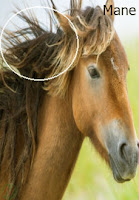 |
| Mane |
Ø Mane / meɪn / (মেইন্) n [the long thick hair that grows along the top of a horse’s neck or around the face and neck of a lion] (সিংহ বা ঘোড়ার ঘাড়ের উপর লম্বা চুল বা কেশর): The horse tossed its flowing mane behind it.
 |
| Mare |
Ø Mare / mer / (মেএর্) n [an adult female horse] (ঘোটকী; মাদি ঘোড়া বা মাদি গাধা):
Ø Filly / ˈfɪli / (ˈফিলি) n {Plu. fillies} [a young female horse] (বাচ্চা ঘোটকী):
 |
| Stallion |
Ø Stallion / ˈstæliən / (ˈস্ট্যালিএন্) n [a fully grown male horse which is used for breeding] (মদ্দা ঘোড়া; <সাধারণত প্রজননার্থে রক্ষিত> খোজা করা হয়নি এমন ঘোড়া):
Ø Colt / koʊlt / (কৌল্ট্) n [a young male horse up to the age of four or five] (অশ্বশাবক; ঘোড়ার বাচ্চা):
Ø Foal / foʊl / (ফৌল্) n [a very young horse or donkey] (ঘোড়া বা গাধার ছোট বাচ্চা):
Ø Spay / speɪ / (স্পেই) v {Pt. Pp. spayed / speɪd / (স্পেইড্)} [to remove the ovaries of a female animal, to prevent it from breeding] (<স্ত্রীজাতীয় প্রাণীর> গর্ভাশয় অপসারণ করা): We’re having the cat spayed.
Ø Gelding / geldɪŋ / (গেল্ডিঙ্) n [a male horse that has been gelded] (খাসি করা ঘোড়া):
<VERB> Geld /geld/ (গেল্ড্) v {Pt. Pp. gelded /geldɪd / (গেল্ডিড্)} [to remove the testicles of a male animal, especially a horse] (নিবীর্য করা; খোজা বা খাসি করা):
<SYN> Castrate
Ø Mount / maʊnt / (মাউন্ট্) v {Pt. Pp. mounted / maʊntɪd / (মাউন্টিড্)} [to get on a bicycle, horse, etc. in order to ride it] (<ঘোড়া বা সাইকেলে> চড়া; আরোহণ করা): He mounted his horse and rode away.
Ø Neigh / neɪ / (নেই) v [a long, loud, high call that is produced by a horse when it is excited or frightening] (<ঘোড়া>হ্রেষাধবনি করা):
Ø Snort / snɔːrt / (স্নোর্ট্) v [to make an explosive sound by forcing air quickly up or down the nose] (<নাক>ফোঁস-ফোঁস করা): She did an impression of a horse snorting.
Ø Hobble / ˈhɑːbl / (ˈহাঃব্ল্) v [to tie together two legs of a horse or other animal in order to stop it from running away] (<ঘোড়া বা গাধা যাতে বেশি দূর চলে যেতে না পারে সে জন্য>দুই পা বেঁধে রাখা):
Donkey
Donkey / ˈdɔːŋki / (ˈডোঙ্কি) n [the donkey and ass is a domesticated member of the horse family. They have been used as working animals for at least 5000 years ago. They still do the same burdening tasks the donkeys did thousands of years ago, people mainly use the donkeys to help carry heavy loads and transport goods long distances. A male donkey or ass is called a jack, a female a jenny, and a young donkey is a foal. Jack donkeys are often used to mate with female horses to produce mules] (গাধা; গর্দভ): Donkey bray
Ø Task / tæsk / (ট্যাস্ক্) n [a piece of work that Sb has to do, especially a hard or unpleasant one] (কাজ, বিশেষত শক্ত কাজ):
Ø Bray / breɪ / (ব্রেই) v {brays / breɪz / (ব্রেইয); Pt. Pp. brayed / breɪd / (ব্রেইড্)} [to make the loud noise like a donkey] (গাধার ডাক): The donkey brayed and tried to bolt.
1. Mule
Mule / mjuːl / (মিঊল্) n 1. [a mule is the offspring of a male donkey (jack) and a female horse (mare) to produce a hybrid, with its short, thick head, long ears, thin limbs, small narrow hooves and short mane, the mule shares characteristics of a donkey. In height and body, the shape of neck and rump, uniformity of coat, and teeth, it seems horse-like. The mule comes in all sizes, shapes, and conformations] (খচ্চর; অশ্বতর<পুং গাধা ও ঘোটকীর মিলনজাত সন্তান>):
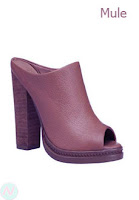 |
| 2. Mule |
2. Mule / mjuːl / (মিঊল্) n [a woman’s shoes or slipper that has no back] (<মেয়েদের>চটি জুতা; মিঊল): a pair of mule shoes
Ø Offspring / ˈɔːfsprɪŋ / (ˈওফ্স্প্রিং) n [the young of an animal] (<পশুপাখির> বাচ্চা):
Ø Limb / lɪm / (লিম্) n [an arm or leg of a person or animal, or a large branch of a tree] (দেহের অঙ্গ, বা প্রত্যঙ্গ যেমন বাহু বা ডানা । ২। তরুশাখা): For a while, she lost the use of her limbs.
 |
| Rump |
Ø Rump / rʌmp / (রাম্প্) n [the round area of flesh at the top of the back legs of an animal that has four legs] (পশুর পশ্চাদভাগ/ পাছা): He slapped the horse on the rump.
Ø Uniform / ˈjuːnɪfɔːrm / (ˈইঊনিফোর্ম্) n [the same; not changing or different in any way] (একই; সমান; সমরুপ): Growth has not been uniform across the country.
<NOUN> Uniformity / juːnɪˈfɔːrməti / (ইঊনিফোর্মএটি) n [] (একরুপতা; সমরুপতা):
Ø Coat / koʊt / (কৌট্) n [the fur, hair or wool that covers an animal’s body] (<প্রাণীর লোম, চুল ইত্যা>আচ্ছাদন): a dog with a smooth/ shaggy coat.
Ø Seem / siːm / (ছীম্) v {Pt. Pp. seemed / siːmd / (ছীম্ড্)} [to give the impression of being or doing Sth] (প্রতীয়মান হওয়া; মনে/ বোধ হওয়া): They seem to be taking a long time to decide.
<SYN> Appear
Ø Conformation / ˌkɑːnfɔːrˈmeɪʃn / (ˌকাঃনফোরˈমেইশ্ন্) [the way in which something is formed; the structure of Sth, especially an animal] (আকার ও অবয়ব; গঠোনপ্রণলী): The judges run their hands over the dog’s body and legs, checking its conformation.
Goat
Goat / goʊt / (গৌট্) n [goat is domesticated from the wild goat of Southwest Asia and Eastern Europe and closely related to the sheep. They are one of the oldest domesticated species and have been used for their milk, meat, hair, and skins over much of the world. Female goats are referred to as “nanny goat” intact males as “billy goat” and their offspring are “kid”, and a castrated male is “wether” ] (ছাগল): A goat is bleating.
Ø Skin / skɪn / (স্কিন্) n 1. [the skin of a dead animal with or without its fur used for making leather, etc.] (<লোমহীন বা লোমসহ> পশু-চামড়া বা ত্বক): The skins are removed and laid out to dry.
 |
| Skin |
2. <VERB> Skin / skɪn / (স্কিন্) v {Pt. Pp. skinned / skɪnd / (স্কিনড্)} [to remove the skin an animal, a fruit or a vegetable] (<পশুপাখি, ফল, সব্জি ইত্যাদির>ছাল বা চামড়া ছাড়ানো): The hunters skinned the deer they had killed.
Ø <PHR-V> Refer to / rɪˈfɜːr tuː / (রিˈফা্র টূ) phr [to mention or speak about Sb/Sth] (উল্লেখ করা; নির্দেশ করা): She always referred to Ben as ‘that nice man’.
 |
| Nanny Goat |
Ø Nanny goat / ˈnæni goʊt / (ˈন্যানি গৌট্) n [a female goat] (বকরি; ছাগী; পাঠি):
 |
| Billy goat |
Ø Billy goat / ˈbɪli goʊt / (ˈবিলি গৌট্) n [a male goat] (পুং ছাগল; পাঠা):
 |
| Kid |
Ø Kid / kɪd / (কিড্) n 1. [a young goat] (ছাগলছানা): 2. [a child or young person] (শিশু; বাচ্চা; তরুণ): Do you have any kids? How are the kids?
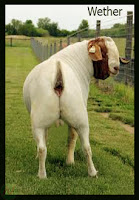 |
| Wether |
Ø Wether / weðər / (ওএদএর্) n {Also castrated goat} [a male goat castrated before sexual maturity] (খাসি):
Ø Bleat / bliːt / (ব্লীট্) v {Pt. Pp. bleated / bliːtɪd / (ব্লীটিড্)} [to make the sound that sheep and goats make] (<ছাগল বা ভেড়ার>ডাক বা ভ্যা ভ্যা করা):
Sheep
Sheep / siːp / (শীপ্) n {Plu. sheep} [it is thought that the domestic sheep originated from central Europe and Asia. Today they are typically kept as livestock, sheep are raised for fleece (wool), meat (called mutton or lamb), and milk. Sheep’s wool is the most widely used animal fiber and common material in the world. An adult female sheep is referred to as a ewe, an intact male as a ram, a castrated male as wether (or castrated sheep), and a younger sheep as a lamb] (ভেড়া; মেষ; গড্ডল): We heard sheep baaing in the field. The dogs herded the sheep into the pen. A flock of sheep
Ø Typically / ˈtɪpɪkli / (ˈটিপিকলি) adv [used when you are giving an average or usual example of a particular thing] (সাধারণত): Typically, a doctor will see about thirty patients a day.
Ø Fleece / fiːs / (ফ্লীছ্) n [the wool coat of a sheep; this coat when it has been removed from a sheep (by shearing)] (ভেরার লোমসম্ভার): My jacket is lined with fleece.
Ø Mutton / ˈmʌtn / (ˈমাট্ন্) n [the meat from an adult sheep eaten as food] (<পূর্ণবয়স্ক> ভেরার মাংস; মেষ মাংস):
 |
| Ewe |
Ø Ewe / juː / (ইউ) n [a female sheep, especially an adult one] (ভেড়ী): Ewe’s milk
 |
| Ram |
Ø Ram / ræm / (র্যাম্) n 1. [an adult male sheep] (পুরুষ ভেড়া; ভেড়ার পাঁঠা):
2. Ram / ræm / (র্যাম্) v {Pt. Pp. rammed / ræmd / (র্যামড্)} [(of a vehicle, a ship, etc.) to hit another vehicle, ship, etc. with force] (<যানবাহন সম্বেন্ধে>প্রচণ্ড জোরে ধাক্কা মারা <অন্য বাহনকে>): Someone rammed my car.
Ø Lamb / læm / (ল্যাম্) n [1. A young sheep 2. The flesh of a young sheep eaten as meat] (১। মেষশাবক। ২। মেষশাবকের মাংস): lamb chops
Ø Baa / bɑː / (বাঃ) n [the sound made by sheep or lambs] (ভেড়ার ডাক):
Ø Herd / hɜːrd / (হা্র্ড্) v {Pt. Pp. herded / hɜːrdɪd / (হা্র্ডিড্)} [to make animals move together as a group] (<গবাদি পশু> চড়ানো/ চালিত করা): a shepherd herding his flock.
Ø Pen / pen / (পেন্) n [a small piece of land surrounded by a fence in which farm animals are kept] (গরু, ছাগল, ভেরা, মুরগি ইত্যা রাখার জন্য ঘেড়াদেওয়া ছোট ঘর; খোঁয়াড়): a goat/sheep/cattle pen
Fat-tailed Sheep
Fat-tailed sheep / ˈfætˌteild siːp /
(ˈফ্যাট্ ˌটেইল্ড্ শীপ্) n [one of a class of sheep with much
fat along the sides of the tail bones, raised for their meat and widely distributed
in southeast Europe, northern Africa, Middle East Asia, Western China, and
Somalia] (দুম্বা):
Dog
Dog / dɔːg / (ডোগ্) n {Fem. Bitch} [the dog is a subspecies of the gray wolf and is thought to have been first domesticated in East Asia thousands of years ago. Many people, in all countries around the world, keep dogs as pet animals. They perform many roles for people, such as hunting, herding, pulling loads, protection, assisting police and military, companionship, and more recently, aiding handicapped individuals (service dogs). This impact on human society has given them the nickname “man’s best friend” in the Western world. In China and South Vietnam dogs are a source of meat for humans] (কুকুর; সারমেয়): The dog was gnawing an old bone. A dog was sniffing around my heels. We could hear dogs barking in the distance. Our bitch has just had four puppies.
Ø Perform / pərˈfɔːrm / (পএরˈফোর্ম্) v {Pt. Pp. performed / pərˈfɔːrmd / (পএরˈফোর্ম্ড্)} [to do Sth, such as a piece of work, task or duty] (<কোনোকাজ বা কর্তব্য> পালন করা; কাজে পরিনত করা): A computer can perform many tasks at once.
<SYN> Carryout
Ø Assist / əˈsɪst / (এˈছিছট্) v {Pt. Pp. assisted / əˈsɪstɪd / (এˈছিছটিড্)} [to help Sb to do Sth] (<কোনোকিছু করতে> সাহায্য/ সহায়তা করা): We’ll do all we can to assist you.
Ø Handicapped / ˈhændɪkæpt / (ˈহ্যানডিক্যাপ্ট্) adj [not able to use part of your body or your mind because it has been damaged in some way] (প্রতিবন্ধী; বিকলাঙ্গ): The accident left him physically handicapped.
<SYN> Disabled
Ø Individual / ˌɪndɪˈvɪdʒuəl / (ˌইনডিˈভিজুএল্) adj [connected with one person; designed for one person] (বিশেষভাবে এক ব্যক্তি বা বস্তুর জন্য; পৃথক): As a teacher, he tries to give individual attention to his pupils.
Ø Impact / ˈɪmpækt / (ˈইমপ্যাক্ট্) n [the powerful effect that Sth has on Sb/Sth] (প্রভাব; ফল): The report assesses the impact of AIDS on the gay community.
 |
| Gnaw |
Ø Gnaw / nɔː / (নো) v {Pt. Pp. gnawed / nɔːd / (নোড্)} [to keep biting Sth or chewing it hard, so that it gradually disappears] (<শক্ত কিছু> একনাগাড়ে কামড়ানো): Babies like to gnaw hard objects when they’re teething.
Ø Sniff / snɪf / (স্নিফ্) v {Pt. Pp. sniffed / snɪft / (স্নিফ্ট্)} [to breathe air in through the nose in order to discover or enjoy the smell of Sth] (<কোনোকিছু ভাল মন্দ> শুঁকে দেখা): He sniffed his socks to see if they needed washing.
Ø Bark / bɑːrk / (বাঃর্ক্) n 1. [the short loud, rough sound made by dogs and some other animals](ঘেউঘেউ/ হুক্কাহুয়া <শিয়াল্ বা কুকুরের ডাক>): The dog gave a loud bark. 2. [the hard outer covering of a tree] (<গাছের> বাকল/ছাল): The people strip the bark and use it in medicines.
<VERB> [(of a dog) to make a loud rough noise] (<কুকুর, শেয়াল ইত্যাদে সম্বন্ধে> ঘেউঘেউ বা হুক্কাহুয়া করা): The dog suddenly started barking at us.
Ø Have / həv / (হএভ্) v {Pt. Pp. had} [to give birth to a baby] (জন্ম দেওয়া): Elian had a baby girl yesterday. My mother had me at home.
 |
| Puppy |
Ø Puppy / ˈpʌpi / (ˈপাপি) n {Plu. puppies} [a young dog] (কুকুরশাবক; কুকুরের বাচ্চ): a little of puppies
<SYN> Pup; Whelp
Cat
Cat / kæt / (ক্যাট্) n {Male. Tomcat} [they are often called house cats, with a small, typically furry, carnivorous mammal, kept as indoor pets. Cat’s senses are superior in the animal world, with exceptional sight, smell, and taste, cats are able to subtly sneak up on, and catch their prey with immense success. Despite the cat’s unbeatable night vision, a cat’s eyesight during the day is actually not too dissimilar from a human's! The pet cat sleeps for around 18 hours a day and tends to spend its wading time hunting for food. They are nocturnal hunters looking for small animals and mice] (বিড়াল): The kitten mewed pitifully. The cat slunk away into the darkness.
Ø Tomcat / tɑːmkæt / (টাঃমক্যাট্) n [a male cat] (ছেলে বিড়াল):
ØCarnivore / ˈkɑːrnɪvɔːr / (ˈকাঃরনিভোর্) n [any animal that eats flesh] (<মাংসাশী> প্রাণী): Lions and tigers are carnivores.
<ADJ> Carnivorous / kɑːrˈnɪvərəs / (কাঃরˈনিভএরএছ্) adj [] ():
Ø Sense / sens / (ছেনছ্) n [one of the five powers (sight, hearing, smell, taste, and touch) that your body uses to get information about the world around you] (অনুভূতি; বোধ; চেতনা): Dogs have a keen sense of smell.
Ø Sight / saɪt / (ছাইট্) n [the ability to see] (দৃষ্টিশক্তি): He has very little sight in his right eye.
Ø Subtle / ˈsʌtl / (ˈছাটল্) adj [not very noticeable or obvious] (সূক্ষ্ণ; অতিসূক্ষ্ণ): There are subtle differences between the two versions.
<ADV> Subtly / ˈsʌtli / (ˈছাট্লি) adv [] (অতিসূক্ষ্ণভাবে):
Ø Sneak / sniːk / (স্নীক্) v [to go somewhere secretly, trying to avoid being seen] (নিঃশব্দে চোরের মতো চলা, আসা, যাওয়া ইত্যাদি): Did you sneak into my room while I was asleep.
<SYN> Creep
<PHR-V> Sneak up (on Sb/Sth) [to move towards Sb very quietly so that they do not see or hear you until you reach them] (চুপিসারে কারো নিকট যাওয়া): He sneaked upon his sister and shouted ‘boo!’
Ø Immense / ɪˈmens / (ইˈমেন্ছ্) adj [extremely large or great in size or degree] (অপরিমেয়; বিশাল; অপার; বিপুল): The benefits are immense.
<SYN> Enormous
Ø Despite / dɪˈspaɪt / (ডিˈছপাইট্) pre [without taking any notice of or being influenced by; not prevented by] (<কিছু> সত্ত্বেও): Despite applying for hundreds of jobs, he is still out of work.
<SYN> In spite of
Ø Unbeatable / ʌnˈbiːtəbl / (আনˈবীটএব্ল্) adj [(of price, value, etc.) impossible to improve] (অপরাজেয়): unbeatable offers
<SYN> Invincible
Ø Eyesight / ˈaɪsaɪt / (ˈআইছাইট্) n [the ability to see] (দৃষ্টিশক্তি): You need to have your eyesight tested. A good/bad/poor eyesight
Ø Dissimilar / dɪˈsɪmɪlər / (ডিˈছিমিলএর্) adj [not the same or different] (বিসদৃশ; ভিন্ন): The two languages are completely dissimilar from each other.
Ø <PHR-V> Look for Sth [to hope for Sth; to expect Sth] (পেতে চেষ্টা করা; অনুসন্ধান করা; প্রত্যাশা করা): I’m looking for my keys.
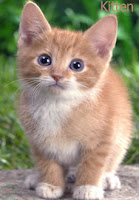 |
| Kitten |
Ø Kitten / ˈkɪtn / (ˈকিট্ন্) n [a young cat] (বিড়ালছানা):
Ø Mew / mjuː / (মিউ) n [the soft high noise that a cat makes] (<বিড়ালের> মিউ মিউ বা মেও মেও ডাক):
<SYN> Meow
Ø Slink / slɪŋk / (স্লিঙ্ক্) v {Pt. Pp. slunk / slʌŋk / (স্লাঙ্ক্)} [to walk away from somewhere quiet so that you are not noticed] (চোরের মতো সটকে পড়া, ঢুকে পড়া ইত্যাদি): The dog howled and slunk away.
Rabbit
Rabbit / ˈræbɪt / (ˈর্যাবিট্) n [rabbits are small mammals, found in several parts of the world. their habitats include meadows, woods, forests, grasslands, wetlands, and deserts where there is enough food and water for the rabbits to survive. They are herbivores that feed by grazing on grass, sometimes nuts, often fruit, vegetables, and leafy weeds. Rabbits are kept as pets or for flesh] (খরগোশ): a rabbit hutch
Ø Habitat / ˈhæbɪtæt / (ˈহ্যাবিট্যাট্) n [the natural environment in which an animal or plant usually lives] (<উদ্ভিদ; জীবজন্তু সম্বন্ধে> স্বাভাবিক বিচরণ বা লালনক্ষেত্র; আবাস ভূমি): The panda’s natural habitat is the bamboo forest.
Ø Meadow / ˈmedoʊ / (ˈমেডৌ) n [a field covered in grass and often wildflowers in it] (তৃণভূমি): There was a path through the meadow to the village.
Ø Wood / wʊd / (উউড্) n {Plu. woods} [an area of trees, smaller than a forest] (বণভূমি, অরণ্য): We went for a walk in the woods after lunch.
Ø Grassland / ˈgræslænd / (ˈগ্র্যাছল্যান্ড্) n [a large area of open land covered with wild grass] (বৃক্ষহীন বণ্য তৃণভূমি):
Ø Wetland / ˈwetlənd / (ˈওয়েট্লএনড্) n [a large area of land covered with swamp] (জলাভূমি): The wetlands are home to a large variety of wildlife.
Ø Herbivore / ˈhɜːrbɪvɔːr / (ˈহা্র্বিভোর্) n [an animal that eats only plants] (তৃণভোজী প্রাণী): Cows and sheep are herbivores.
Ø Weed / wiːd / (উঈড্) n [a wild plant growing where it is not wanted, especially among crops or garden plants] (আগাছা): The yard was overgrown with weeds.
Ø Hutch / hʌtʃ / (হাচ্) n [a wooden box with a front made of wire, used for keeping rabbits or other small animals in] (একদিকে তারের জাল-ঢাকা বাক্স বা খাঁচা):
Rat
Rat / ræt / (র্যাট্) n [rat is a small scavenger mammal found in all parts of the world and lives in small, dark places. That has proved to be a pest in both urban and rural areas where they are normally present due to an abundance of food. Rats are much larger than mice] (ধেড়ে ইঁদুর): Rats carry disease. Rats had gnawed through the wires.
Ø Scavenge / ˈskævɪndʒ / (ˈস্ক্যাভিন্জ্) v [(of a person, an animals or birds) to search through waste for things that can be used or eaten] (<মানুষ, পাখি বা প্রাণী সম্বন্ধে> ময়লা বা আবর্জনার মধ্যে খাবার খোজা): Dogs and foxes scavenged through the trash cans for something to eat.
<NOUN> Scavenger / ˈskævɪndʒər / (ˈস্ক্যাভিনজএর্) n [(of a person, an animals or birds) which search food in waste] (যে সব প্রাণী আবর্জনার মধ্যে খাবার খোজে; শবালী প্রাণী):
Ø Pest / pest / (পেছ্ট্) n [an insect or animal that destroys the plant, food, etc.] (ক্ষতিকর কীটপতঙ্গ/ প্রাণী): Common pests such as rats, mice or cockroaches.
Ø Abundance / əˈbʌndəns / (এˈবানডএন্ছ্) n [when there is more than enough of something] (অতিপ্রাচুর্য): Exotic plants grew there in great abundance.
1. Mouse
Mouse / maʊs / (মাউছ্) n {Plu. mice // (মাইছ্)} 1. [mouse is a small rodent having a pointed snout, small rounded ears, a scaly long, thin tail, and a high breeding rate, that is spread widely thoroughly every country. That is found in all corners of the globe, including parts of Antarctica] (নেংটি ইঁদুর; মূষিক): The stores were overrun with rats and mice.
 |
| 2. Mouse |
2. Mouse / maʊs / (মাউছ্) n [a small device that is moved by hand across a surface to control the movement of the cursor on a computer screen] (মাউছ্): Use the mouse to drag the icon to a new position.
Ø Snout / snaʊt / (স্নাউট্) n [the long nose and mouth which stick out from the face of some animals] (<কোনো কোনো প্রাণীর> বাইরের দিকে বেড়িয়ে থাকা নাক): a pig’s snout
Ø Scaly / ˈskeɪli / (ˈস্কেইলি) adj [(of skin) covered with hard and dry, with small pieces that came off] (<মাছের> আইশের ন্যায়):
Ø Overrun / ˌoʊvəˈrʌn / (ˌওউভএˈররা্ন) v [(especially of Sth bad or not wanted) to fill or spread over an area quickly, especially in large numbers] (ছড়িয়ে পড়া বা ভোরে যাওয়া; বেড়ে যাওয়া): The house was completely overrun with mice.
Shrew
Shrew / ʃruː / (স্রূ) n [a small brown
mole-like mammal but with a long pointed nose and small eyes] (চিকা; ছুঁচো):
Gerbil
Gerbil / ˈdʒɜːrbɪl / (ˈজাঃর্বিল্) n [a small desert animal like a mouse with long back legs that is often kept as a pet] (জারবল):
1. Chicken
Chicken / ˈtʃɪkɪn / (ˈচিকিন্) n 1. [the chicken is a domesticated fowl, a subspecies of red jungle fowl. As one of the most common and widespread domestic animals, with a population of more than 25 billion, which is the highest of any bird in the world. They are an omnivore. In the yard, they often scratch at the soil to search for seeds and insects. A male chicken is called cock/rooster and a female is called a hen, and the little, fluffy yellow babies are called chicks.] (মুরগি): A male chicken is called a cock, and a female chicken is called a hen.
 |
| 2. Chicken |
2. Chicken / ˈtʃɪkɪn / (ˈচিকিন্) n [meat from a chicken which is cooked and eaten] (মুরগির মাংস): We’re having roast/fried chicken for dinner. The cock started to crow.
Ø Fowl / faʊl / (ফাউল্) n [a bird that is kept for its meat and eggs, for example, a chick, ducks, turkeys] (<মাংস ও ডিমের জন্য> যে কোনো পাখি): a variety of domestic fowl
Ø Widespread / ˈwaɪdspred / (ওয়াইড্স্প্রেড্) adj [existing or happening over a large area or among many people] (বহুবিস্তৃত; অতিব্যাপক): The campaign has received widespread support.
Ø Population / ˌpɑːpjuˈleɪʃn / (ˌপাঃপিউˈলেইশ্ন্) n [a particular group of animals living in one country, area or place] (<কোনো এলাকার>প্রাণীবৃদ্ধিরসংখা): The dolphin populating has been decimated by tuna fishing.
Ø Omnivore / ˈɑːmnɪvɔːr / (ˈআঃমনিভোর্) n [an animal or a person that eats all types of food, especially both plants and meat] (সর্বভুক প্রানী):
Ø Scratch / skrætʃ / (স্ক্র্যাচ্) v {Pt. Pp. scratched / skrætʃt / (স্ক্র্যাচ্ট্)} [to rub skin or surface with nails] (<নখর দ্বারা> আঁচড়ান; হাছড়ানো): The dog scratched itself behind the ear.
 |
| Cock |
Ø Cock / kɑːk / (কাঃক্) n {also Rooster} [an adult male chicken] (মোরগ): The cock crowed.
Ø Crow / kroʊ / (ক্রৌ) v {Pt. Pp. crowed / kroʊd / (ক্রৌড্)} [(of a cock/rooster) to make repeated loud high sounds, especially early in the morning] (<মোরগের ডাক> কুকরুক কুক): We were woken at dawn by a cock crowing repeatedly.
 |
| Hen |
Ø Hen / hen / (হেন্) n [an adult female chicken, which is kept for its eggs or flesh] (স্ত্রী মুরগি): a small flock of laying hens. A hen is clucking. Battery hens
Lay / leɪ / (লেই) v {Pt. Pp. laid / leɪd / (লেইড্)} [a bird, an insect, a fish, etc. lays eggs, it produces them from its body] (ডিম পারা বা দেওয়া): Does your hen lay eggs? The hens are not laying well (= not producing many eggs).
Ø Cluck / klʌk / (ক্লাক্) v [to make the low interrupted noise that a chicken makes] (মুরগির ডাক):
Battery / ˈbætri / (ˈব্যাট্রি) adj [a large number of small cages that are joined together and are used for keeping chickens, etc. in on a farm] (একই প্রকারের বাক্সের সারি যাতে ডিম পাড়ার জন্য বা পুষ্ট হওয়ার জন্য মুরগি): a battery farm. a battery eggs/hen
Ø Fluff / flʌf / (ফ্লাফ্) n [soft animal fur or bird feathers, which is found especially on young animals or birds] (তুলতুলে, নরম লোম/ পালক): The baby birds were still covered in fluff.
<ADJ> Fluffy / ˈflʌfi / (ˈফ্লাফি) adj [like fluff; covered in fluff] (তুলতুলে): a little fluffy kitten
<ADJ> Fluffy / ˈflʌfi / (ˈফ্লাফি) adj [like fluff; covered in fluff] (তুলতুলে): a little fluffy kitten
 |
| Chick |
Ø Chick / tʃɪk / (চিক্) n [a baby bird, especially a young chicken] (মুরগির ছানা/ বাচ্চা):
Guinea fowl / ˈɡɪni ˌfaʊl / (ˈগিনি ˌফাউল্) n {Plu. guinea fowl; Ma. guinea cock,
Fe. guinea hen} [a large West African
bird of the pheasant family, having a dark grey or blackish plumage mottled
with white; raised for its eggs and meat] (চিনা
মোরগ বা মুরগি):
Ø Mottled / ˈmɑːtld / (ˈমাঃটল্ড্) adj [covered with areas of different colors
without a regular pattern] (নানাবর্ণের
ছাপযুক্ত): the mottled skin of a
snake
Quail
Quail / kweɪl / (কোয়েল) n [a small brown bird, whose meat and eggs are used for
food; the meat of this bird] (কোয়েল):
1. Duck
Duck / dʌk / (ডাক্) n {Plu. ducks} [ducks are mostly aquatic birds and have short legs, and a wide beak. They have adapted well to life on the water and along with their special water filtering system in their mouths, ducks also have webbed feet which allow them to travel on the surface of the water with ease. The webbed feet of the duck also make it easier for the duck to walk on the slippery river banks] (পাঁতিহাস): Ducks were quacking noisily on the lake. A female is called a duck and a male is called a Drake.
2. Duck / dʌk / (ডাক্) n [meat from a duck] (হাঁসের মাংস): roast duck with orange sauce.
Ø Aquatic / əˈkwætɪk / (এˈকোঅ্যাটিক্) adj [connected with water] (জলজ): aquatic life/sports
Ø Beak / biːk / (বীক্) n [the hard pointed or curved outer part of a bird’s mouth] (<পাখির> ঠোঁট): Birds use their beaks to pick up food.
<SYN> Bill
 |
| Webbed |
Ø Webbed / webd / (ওয়েব্ড্) adj [(of the feet of a swimming bird or other aquatic animals) having pieces of skin between the toes] (<পায়ের আঙ্গুল> চামড়া দিয়ে জোড়া-লাগানো এমন <জলচর প্রাণী বা পাখীর> পা; লিপ্ত পদাঙ্গুলি):
Ø Ease / iːz / (ঈজ্) n [lack of difficulty] (আরাম; সহজসাধ্যতা; স্বচ্ছন্দ্য): He passed the exam with ease.
<VERV> Ease / iːz / (ঈজ্) v {Pt. Pp. eased / iːzd / (ঈজ্ড্)} [to become or to make Sth less unpleasant, painful, sever, etc.] (আরাম দেওয়া; সহজ করা; স্বস্তি বিধান করা): These pills should ease the pain.
<SYN> Alleviate
<ADJ> Easy / ˈiːzi / (ˈঈজি) adj [not difficult; needing little effort] (অনায়াস; সহজ): It isn’t easy being a parent.
Ø Bank / bæŋk / (ব্যাঙক্) n [the side of a river, canal, etc. and the land near it] (<নদী বা খালের> তীর; তট; কুল; কিনার): She jumped in and swam to the opposite bank.
Ø Quack / kwæk / (কোএ্যাক্) n 1. [the sound that a duck makes] (হাঁসের ডাক): The ducks started quacking loudly when we threw them some bread.
 |
| 2. Quack |
2. Quack / kwæk / (কোএ্যাক্) n [a person who dishonestly pretends to have medical skills or knowledge] (হাতুড়ে <ডাক্তার>):
Ø Drake / dreɪk / (ড্রেইক্) n [a male duck] (পুরুষ পাতি হাঁস; হাসা):
 |
| Duckling |
Ø Duckling / ˈdʌklɪŋ / (ˈডাকলিঙ্) n [a young duck, or its flesh used as food] (হাসের বাচ্চা বা এর মাংস):
Khaki Campbell Duck
Khaki
Campbell duck / ˈkɑːki ˈkæmbəl dʌk / (খাঃকি ক্যামবেল ডাক্) n
[The Campbell is a British breed of domestic
duck. It was developed in England, at the turn of the 20th century; being
introduced to the public in 1898, and the Khaki variety in 1901.] (খাকি
ক্যামবেল হাস)
Swan
Swan / swɑːn / (ছোআঃন্) n [the swans are the largest members of the waterfowl family. They can reach a length of over 1.5m and weigh over 15 kg. Their wingspans can be over 3.1m. They are closely related to geese and ducks. They are generally white in color with an orange beak] (রাজহাঁস; মরাল; হংস): We watched the swans glide by.
Cob / kɑːb / (কাব্)
n [a male swan] (ছেলে রাজহাঁস;
পুং মরাল): A cob will attack anything that threatens his pen and their
cygnets.
 |
| Pen |
Pen / pen / (পেন্)
n [a female swan] (মেয়ে রাজহাঁস;
স্ত্রী মরাল): The cob and pen then send their grown cygnets off to find
their own water.
 |
| Cygnet |
Cygnet / ˈsɪɡnət / (সিগ্নএট্)
n [a young swan] (রাজহাঁসের
বাচ্চা; মরালশাবক):
Ø Weigh / weɪ / (ওএই) v {Pt. Pp. weighed / weɪd / (ওএইড্)} [to have a particular weight or to measure how heavy Sb/Sth is, usually by using scales] (ওজন করা/হওয়া; ভার নির্ণয় করা; মাপা): The average male tiger weighs around 200 kg.
<NOUN> Weight / weɪt / (ওএইট্) n [how heavy Sb/Sth is, which can be measured in, for example, kilograms or pounds] (ওজন; ভার): It is about 75 kilos in weight.
Ø Wingspan / ˈwɪŋspæn / (ˈউইঙ্স্প্যান্) n [the distance between the end of one wing and the end of the other when the wings of a bird, insect or aircraft are fully stretched] (<প্রসারিত> ডানার বিস্তার/ পাখার প্রসারতার দৈর্ঘ): a bird with a two-foot wingspan
Ø Glide / glaɪd / (গ্লাইড্) v {Pt. Pp. glided // (গ্লাইডিড্)} [to fly by floating on air currents instead of using power from wings or an engine] (ক্রমাগত মসৃণ গতিতে ভেসে চলা বা বয়ে চলা বা এগিয়ে চলা): An eagle was gliding high overhead.
Goose
Goose / guːs / (গূছ্) n {Plu. geese} [a goose is a medium to large-sized waterfowl, found in Europe, Asia, and North America. They are omnivorous but mainly feed on insects, grubs, and small fishes. They spend a great deal of time on the water and have special adaptations such as webbed feet, which make their aquatic life easier] (রাজহংসী):
Pigeon
Pigeon / ˈpɪdʒɪn / (ˈপিজিন্) n [a fat grey and white bird with short legs, which is often seen in towns sitting on building in large groups, and is often eaten as food] (কবুতর): A pigeon strutted along the roof, cooing rhythmically.
Ø Strut / strʌt / (স্ট্রাট্) v {Pt. Pp. strutted // (স্ট্রাটিড্)} [to walk proudly with your head up and chest out to show that you think you are important] (বুক ফুলিয়ে সোজা হয়ে দাড়ানো/ হাঁটা): The players strutted and posed for the cameras.
Ø Coo / kuː / (কূ) v [when a dove or a pigeon coos, it makes a soft low sound] (<কবুতর বা ঘুঘু সম্বন্ধে> বাকবাকুম বাকবাকুম করা; কূজন করা):
Turkey
Turkey / ˈtɜːrki / (ˈটা্র্কি) n {Plu. turkeys} [the turkey is a large, round-looking bird, that is closely related to other game birds. They have long, thin legs with three toes on each foot to help with balance and for scratching around in the dirt. Males and females of both turkeys have a red, featherless head and throat, which has a distinctive fleshy wattle that hangs from the top of the beak. Their flesh is one of the most popular meats to eat on festive occasions and is farmed in large numbers across the western world] (তুর্কি মোরগ): roast turkey
2. Turkey / ˈtɜːrki / (ˈটা্র্কি) n [the flesh of this bird used as food] (তুর্কি মোরগের মাংস):
Ø Game / geɪm / (গেইম্) n [wild animals and birds that are hunted for food or sport] (শিকারের পাখি/প্রাণী): a game bird
Ø Toe / toʊ / (টৌ) n [any of the five separate parts at the end of the foot] (পায়ের আঙ্গুল): The shoe pressed painfully against her big toe.
Ø Dirt / dɜːrt / (ডা্র্ট্) n [any substance that makes Sth dirty, for example, dust, soil or mud] (ময়লা; নোংরা): His clothes were covered in dirt.
Ø Distinctive / dɪˈstɪŋktɪv / (ডিˈছটিঙ্কটিভ্) adj [having a quality or characteristic that makes Sth different and easily noticed] (পার্থক্যসূচক; স্বাতন্ত্রসূচক): ‘i’ and ‘iː’ are two distinct vowel sounds in English.
 |
| Wattle |
Ø Wattle / ˈwɑːtl / (ˈওআট্ল্) n [a piece of red skin that hangs down from the throat of a bird such as a cock, turkey] (মোরগ জাতীয় পাখির মাথার নীচের অংশে বা কন্ঠে ঝুলে থাকা লাল মাংসল উপাঙ্গা):
Ø Comb / koʊm / (কৌম্) n 1. [the soft, red piece of flesh on the head of a male chicken] (মোরগের মাথার ঝুটি):
 |
| Comb |
2. Comb / kaʊm / (কৌম্) n [a flat piece of plastic, wood, or metal with a thin row of long narrow parts along one side, which you use to tidy and arrange your hair] (চিরুনি): She ran a comb through her tangled hair.
Ø Flesh / fleʃ / (ফ্লেশ্) n [the soft substance between the skin and bones of an animal or human body] (মাংস<বিশেষত কাঁচা মাংস>): Lions and tigers are flesh-eating animals.
Ø Festive / ˈfestɪv / (ˈফেছটিভ্) adj [typical of a special event or celebration] (উৎসবমুখর; আনন্দঘন): The whole town is in a festive mood.
Guinea Pig
Guinea pig / ˈɡɪni ˌpɪɡ / (ˈগিনি ˌপিগ্) n [a tailless South American rodent covered in fur with rounded short ears, short legs, and no tail. Originally raised for food, it no longer occurs in the wild and is now typically kept as a pet or for laboratory research] (গিনি পিগ):
Pig
Pig / pɪg / (পিগ্) n {USA hog} [an animal with pink, black, or brown skin, short legs, a broad nose, and a short tail that curls around itself. Pigs are kept on farms for their meat (called pork) or live in the wild] (শূকর): Pigs were being fattened for slaughter. boar, sow, piglet, swine
Ø Hog / hɑːɡ / (হআঃগ্) n [a male domesticated pig with its sexual organs removed, reared for its meat] (খাসি করা শূকর):
Ø Omnivorous / ɑːmˈnɪvərəs / (আঃম্ˈনিভএরএছ্) adj [(of an animal or person) naturally able to eat both plants and meat] (সর্বভুক; যে প্রাণী মাংস ও শাক সব্জি সব খায়):
Ø Boar / bɔːr / (বোর্) n [a male pig kept for breeding on a farm, or a type of wild pig] (পুং শূকর বা ছেলে শূকর):
Ø Sow / soʊ / (ছৌ) n [an adult female pig, especially one which has farrowed] (মেয়ে শূকর): The sow had eight piglets.
Ø Pork / pɔːrk / (পোর্ক্) n [meat from a pig, eaten as food] (শূকরের মাংস):
Ø Slaughter / ˈslɔːtər / (স্লোটএর্) v [to kill an animal, usually for its meat] (জবাই করা): The animals are slaughtered in abattoirs.
<SYN> Butcher
Domestic Animals Name Meaning & Image
Noted From Wikipedia, Google Image, Oxford & Cambridge Dictionary
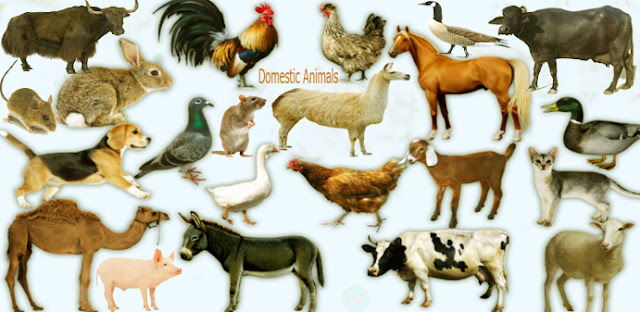




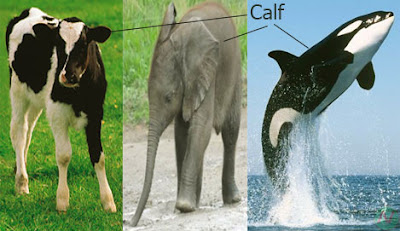






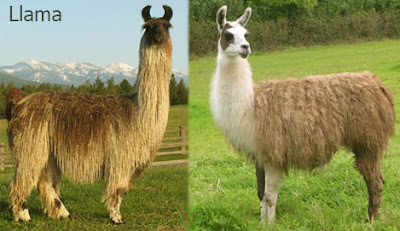

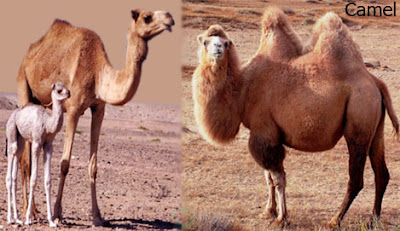







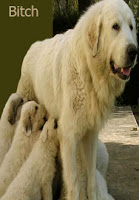









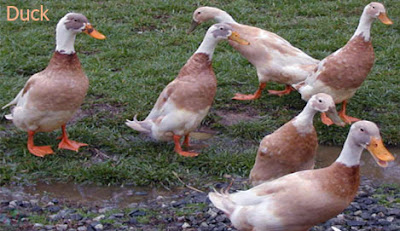



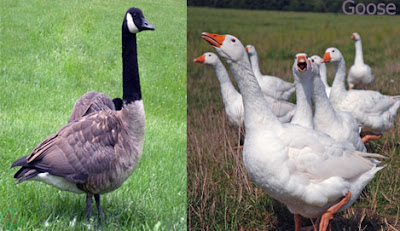














No comments